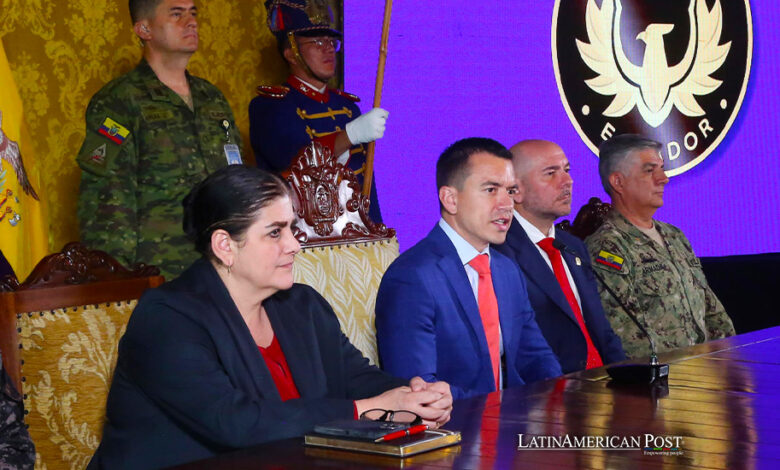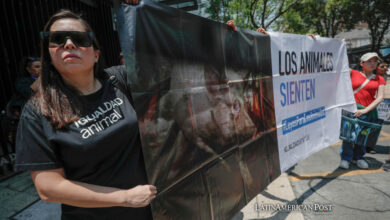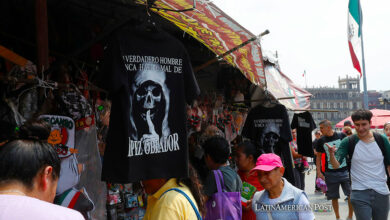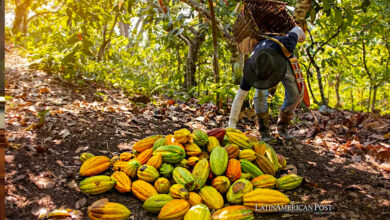Ecuador’s President Declares War on Drug Gangs Amid Prison Hostage Crisis

Ecuador’s newly-elected president, Daniel Noboa, finds himself thrust into a fierce battle against drug gangs that threaten to destabilize the nation. Only 36 years old and the scion of a powerful banana dynasty, Noboa assumed office in November, determined to confront the rampant cocaine trafficking that has plagued the country for years. Little did he know that his resolute stance would unleash a wave of violence and unrest, unlike anything Ecuador has witnessed in recent memory.
Escalation of Drug Trade Sparks Government Action
In response to the escalating drug trade, Noboa’s government declared a state of emergency. It launched a massive military operation against 22 gangs classified as terrorist organizations. The government estimates that approximately 20,000 criminals are involved in these nefarious activities.
The turmoil began with the shocking kidnapping of over 130 prison guards and staff by these drug gangs, a move seemingly prompted by the escape of Adolfo Macias, the notorious leader of the “Los Choneros” gang.
As the crisis escalated, unexplained explosions rocked various cities, and heavily armed assailants briefly seized control of the TC broadcaster in Guayaquil, Ecuador’s largest port city, during a live news program. The terrified journalists on the scene described the harrowing experience of cowering on the floor, fearing for their lives.
Rear Admiral Jaime Vela, the armed forces commander, reported that since the state of emergency was declared, 329 individuals, primarily associated with gangs like Los Choneros, Los Lobos, and Los Tiguerones, have been detained. Disturbing videos have emerged, purportedly depicting acts of extreme violence against prison staff, including shootings and hangings. However, Rear Admiral Vela assured the public that no hostages had been killed.
President Noboa’s Resolute Security Measures
Despite the chaos, President Noboa remains resolute in his commitment to his security policies. He recently announced plans to unveil the design for two new prison facilities, demonstrating his determination to address the root causes of the crisis. Additionally, the president revealed that deportations of foreign prisoners, particularly the 1,500 Colombian inmates in Ecuador’s overcrowded jails, would commence soon to alleviate the strain on resources.
President Noboa’s $800 million security plan, which includes $200 million worth of weapons from the United States, has garnered international attention. The United States has pledged aid to support Ecuador in its fight against drug trafficking.
Meanwhile, Ecuador’s neighbors, Colombia and Peru, both major cocaine-producing countries, have intensified their border controls in response to the crisis. China, a significant investor in Ecuador, has temporarily closed its embassy and consulates after the unrest.
Security Measures Intensify Amidst Unrest
The situation has sent shockwaves throughout Ecuador’s society and economy. Despite the unrest, the government insists that the oil and mining sectors operate typically and has deployed security forces to safeguard crucial exports, including fruit and cocoa.
Soldiers and police have been conducting raids on homes, establishing checkpoints, and reinforcing security in prisons. Many businesses and schools have closed, and the streets are quiet as police and military personnel maintain a visible presence.
Amid anti-gang operations, five gang members were killed in Esmeraldas province, according to General Cesar Zapata, the national police commander. Additionally, police are working to identify three bodies found in a burnt-out car south of Guayaquil. Tragically, two officers were killed by armed individuals in Guayas province, where Guayaquil is located.
Also read: The Wave of Violence in Ecuador Causes Fear in Peru, which Declares an Emergency on the Border
As Ecuador grapples with this unprecedented crisis, the nation’s future hangs in the balance. The resolve of President Daniel Noboa and the efficacy of his security measures will be critical in determining whether Ecuador can emerge from this turbulent period more robust and more resilient against the scourge of drug trafficking that threatens its stability.





